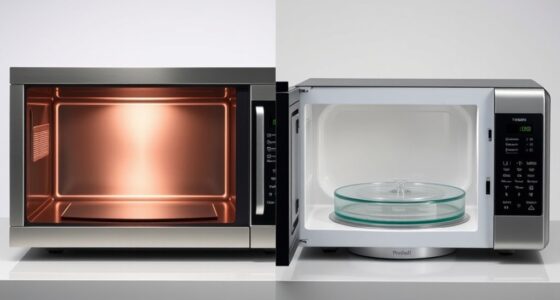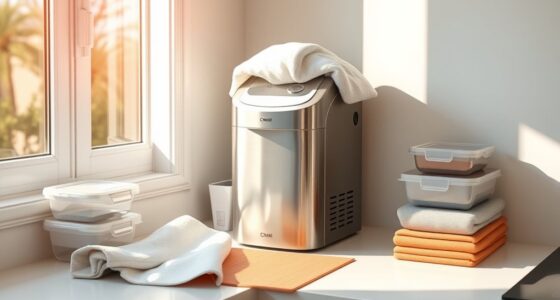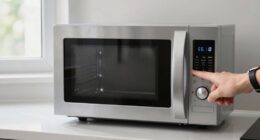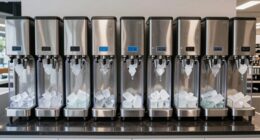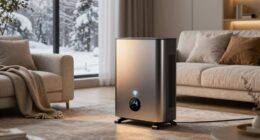Dual evaporator refrigerators use separate zones to control temperature and humidity independently, which helps keep your food fresher longer. Humidity zones are essential because they prevent dehydration, mold growth, and spoilage by maintaining ideal moisture levels for different food types. This precise control also stops odors from mixing and extends the shelf life of produce and seafood. Keep exploring to discover how these features can improve your kitchen experience and food quality.
Key Takeaways
- Humidity zones maintain optimal moisture levels, extending produce freshness and preventing dehydration or mold growth.
- Separate humidity controls prevent cross-contamination of odors, preserving food flavors in each compartment.
- Precise humidity management reduces microbial activity, enhancing food safety and shelf life.
- Different foods require specific humidity conditions; zones allow tailored preservation for fruits, vegetables, and meats.
- Humidity zones improve overall appliance efficiency by optimizing environmental conditions, reducing energy consumption and frost buildup.
Understanding Dual Evaporator Technology
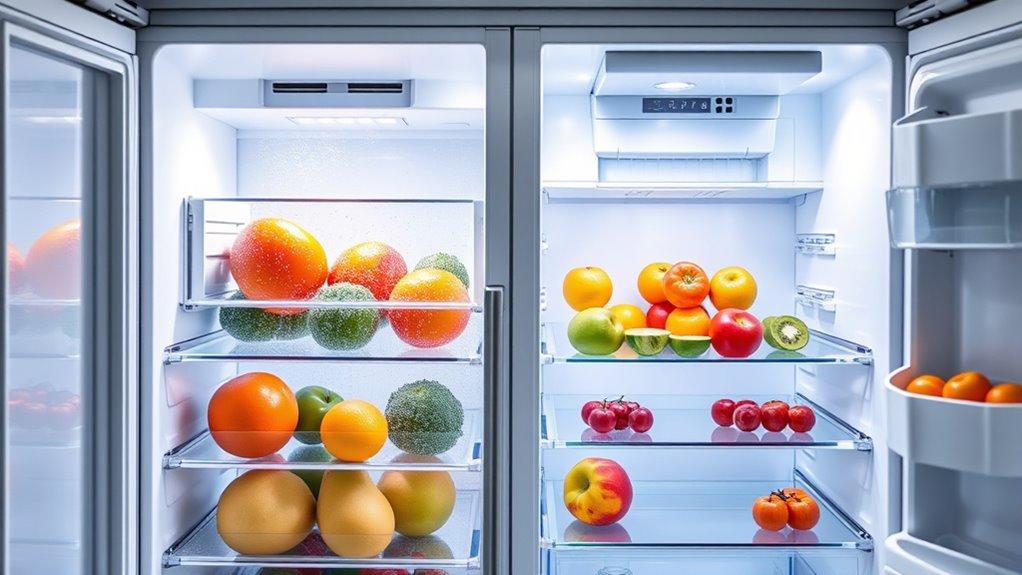
Dual evaporator technology involves using two separate evaporators within a refrigerator to independently control the temperature and humidity of the fresh food and freezer compartments. Typically, each compartment has its own dedicated evaporator, which allows precise regulation of conditions. Refrigerant may flow sequentially through both evaporators or be directed by a 3-way valve, optimizing efficiency. The system often shares a single compressor but uses separate evaporators for each zone. Air circulates independently over each evaporator, maintaining distinct environments. This setup prevents moisture transfer between compartments, helping control humidity levels. It also reduces frost buildup and freezer burn, extends food freshness, and minimizes odor transfer. Dual evaporator systems are especially beneficial in maintaining consistent humidity and temperature levels, which further enhances food preservation and energy efficiency. Proper humidity zones help prevent spoilage and maintain optimal food quality over time. Additionally, designing these zones carefully can contribute to overall energy efficiency in refrigeration.
How Separate Evaporators Enhance Temperature Control
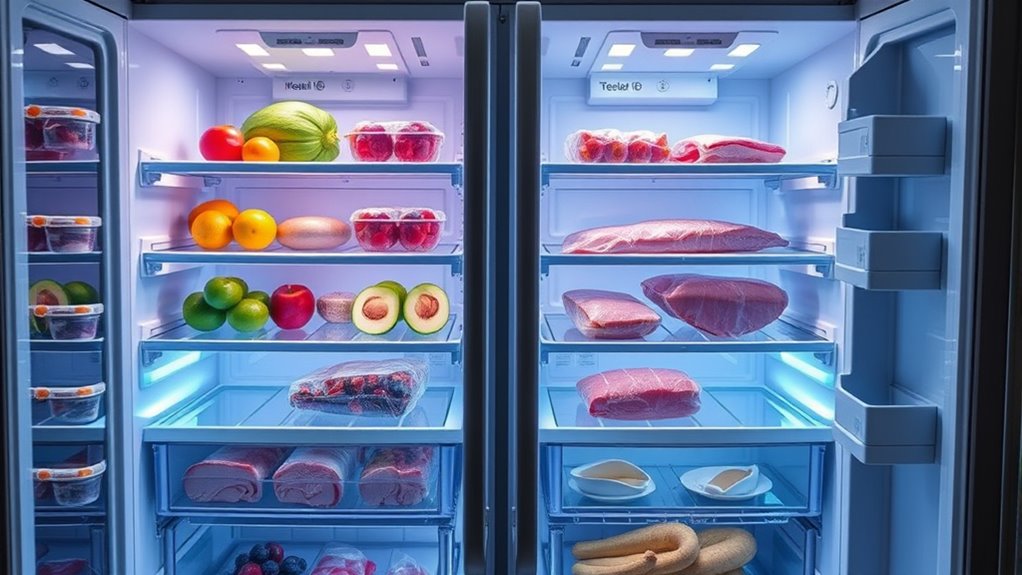
Separate evaporators enable you to set and maintain precise temperatures for the freezer and refrigerator compartments independently, resulting in better food preservation. This setup allows each evaporator to operate at an optimized temperature, reducing fluctuations and keeping food fresher longer. The table below illustrates how this control improves temperature stability:
| Compartment | Temperature Control | Benefits |
|---|---|---|
| Freezer | Independent cooling | Less temperature cycling |
| Refrigerator | Independent cooling | Consistent freshness |
| Airflow | Isolated airflow | No cross-contamination |
| Energy Usage | Optimized operation | Increased efficiency |
| Mechanical Stress | Reduced cycling | Longer component lifespan |
With separate evaporators, you enjoy precise temperature management, enhanced stability, and improved food quality. Humidity zones also benefit from separate evaporation, helping to maintain optimal moisture levels tailored to different types of food. This humidity control is especially important for preserving the texture and flavor of fresh produce.
The Role of Humidity Zones in Food Preservation
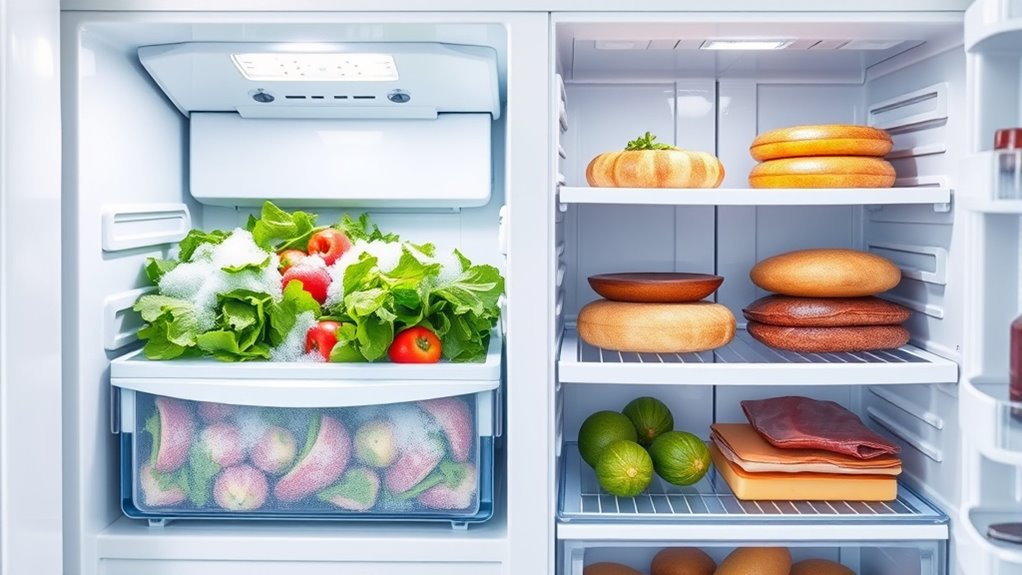
Controlling humidity in your refrigerator helps keep produce fresh longer by balancing moisture levels and preventing dehydration or mold growth. Using the right humidity zones also minimizes the buildup of ethylene gas, which speeds up ripening and spoilage. When you match foods to their ideal humidity environment, you reduce waste and extend the shelf life effectively. Understanding food storage techniques can further optimize food preservation strategies through proper humidity management.
Moisture Retention Benefits
Have you ever noticed how some refrigerators keep produce fresher longer while others cause foods to dry out quickly? That’s the power of moisture retention through humidity zones. Dual evaporators help maintain ideal humidity levels in each compartment, preventing moisture loss. Here’s how it benefits you:
- High humidity keeps vegetables, fruits, and herbs crisp and prevents shriveling.
- It slows dairy and baked goods from drying out, extending shelf life.
- Proper moisture levels reduce spoilage caused by dehydration.
- Separating airflows minimizes microbial growth, keeping food fresher longer.
- Incorporating home decor styling benefits from textile techniques can inspire innovative ways to organize or decorate your storage spaces.
Ethylene Gas Management
Ever wondered how humidity zones in dual evaporator refrigerators help manage ethylene gas and extend produce freshness? These zones control ethylene’s effects by separating produce types and regulating moisture levels. Ethylene accelerates ripening and spoilage, especially in sensitive items like leafy greens. High humidity zones slow water loss and microbial growth, while low humidity zones delay ripening of ethylene producers like apples and bananas. Proper segregation prevents cross-contamination, extending shelf life. Ethylene absorbers and filters further neutralize gas buildup, maintaining freshness longer. Additionally, sound design techniques used in modern appliance manufacturing enhance the acoustic experience, ensuring quiet operation and user comfort. Understanding the gas management system in these refrigerators can significantly improve your food storage strategies. Here’s a visual overview:
| Ethylene Producers | Ethylene-Sensitive Items |
|---|---|
| Apples, Bananas | Leafy Greens |
| Ripen Faster | Need Low Humidity |
| Require Separation | Prevent Spoilage |
Extending Food Freshness With Humidity Management
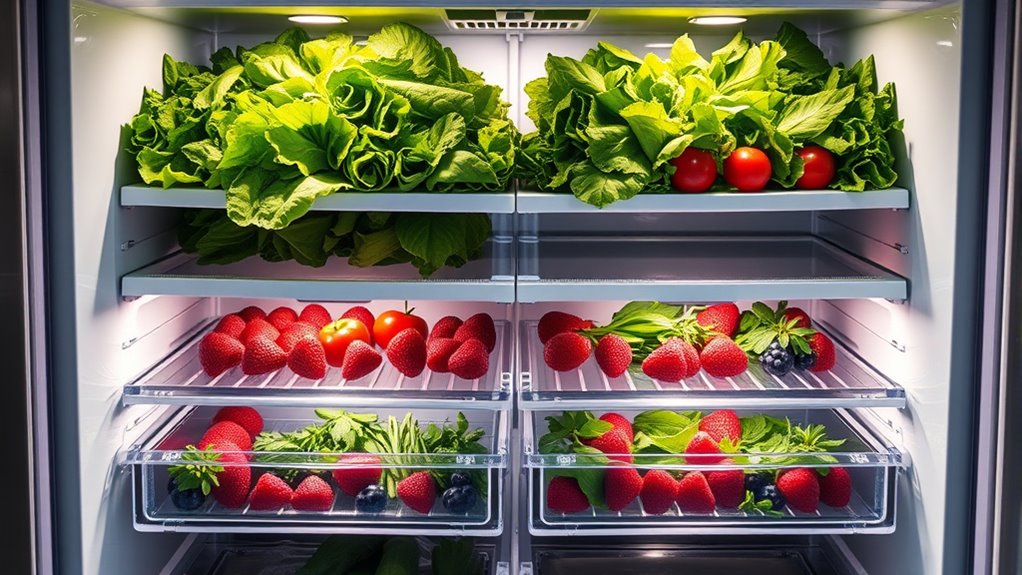
Dual evaporator refrigerators enhance food freshness by precisely managing humidity levels in each compartment. This targeted control helps slow dehydration and spoilage, especially for produce and delicate foods. Here’s how it extends freshness:
Dual evaporator systems precisely control humidity, keeping produce fresh and reducing spoilage longer.
- Higher humidity in the fresh food zone prevents leafy greens and vegetables from wilting and losing crispness.
- Proper moisture levels reduce microbial growth, keeping foods safer longer.
- Specialized humidity zones minimize condensation on fruits, preventing decay and mold.
- Stable moisture levels maintain the texture and flavor of complex foods, reducing spoilage.
- Incorporating moisture control components can also enhance the overall water quality of your refrigerator environment.
- Efficient humidity management can also contribute to a more energy-efficient operation, saving on electricity costs.
Preventing Odor Transfer and Cross-Contamination

Isolated airflow systems in dual evaporator refrigerators play a crucial role in preventing odor transfer and cross-contamination between compartments. Because each compartment has its own evaporator and cooling circuit, air and odors stay confined, avoiding the mixing that occurs in single evaporator systems. Independent fans control temperatures without circulating air between compartments, so strong smells like onions won’t taint your ice or fresh produce. This separation keeps volatile compounds within their original space, preserving flavor and freshness. It also prevents bacteria and mold from spreading across compartments, supporting better hygiene and food safety. As a result, your fridge maintains distinct environments, reduces contamination risks, and keeps your stored foods and ice tasting clean and neutral. This setup simplifies storage and enhances overall food quality. Additionally, ongoing AI safety research emphasizes the importance of designing systems that prevent unintended interactions, which is vital for maintaining the integrity of separate compartments. Humidity zones further contribute to optimal storage conditions by controlling moisture levels specific to different types of foods, helping to preserve freshness and prevent spoilage.
Energy Efficiency Advantages of Dual Evaporator Systems
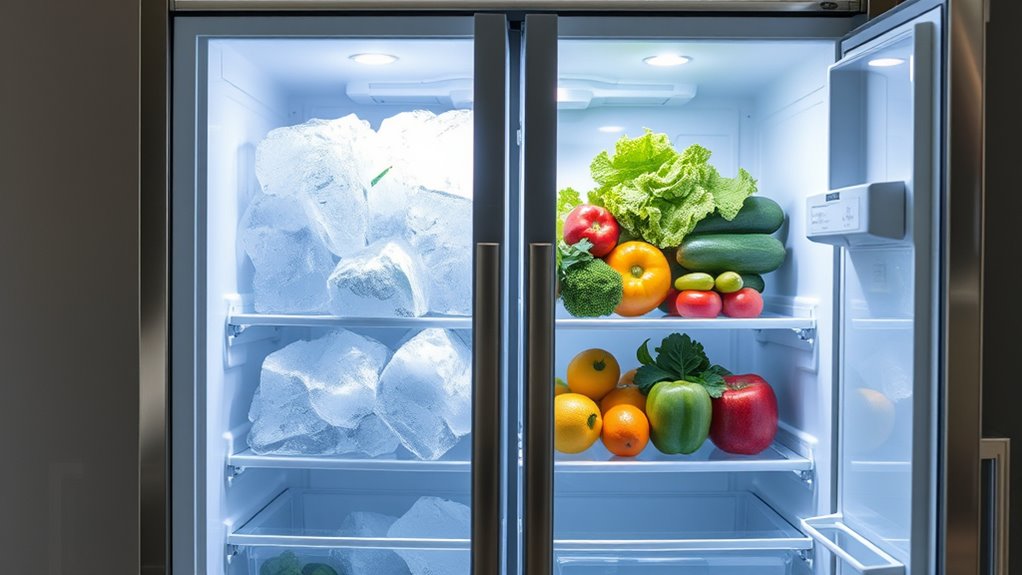
With dual evaporator systems, you gain precise temperature control in each compartment, which helps save energy by reducing unnecessary cooling. They also minimize frost buildup, cutting down on defrosting cycles that waste power. Overall, these features make dual evaporators more energy-efficient than traditional single-evaporator setups. Additionally, automation’s role in business intelligence can optimize system performance and maintenance schedules for even greater efficiency. Understanding humidity zones within refrigeration environments further enhances energy savings by preventing overcooling and maintaining optimal moisture levels.
Separate Temperature Control
Separate temperature control in dual evaporator refrigerators offers significant energy efficiency benefits by allowing each compartment to be cooled independently. This means you can adjust temperatures to fit specific needs without affecting the other space. Here’s how it helps:
- You only cool each compartment as much as needed, reducing unnecessary power use.
- Sensors and microcomputers detect cooling requirements, preventing waste.
- The system minimizes overcooling, balancing energy consumption effectively.
- Less strain on the compressor leads to lower energy bills and longer appliance life.
- HEPA filtration technology ensures cleaner air inside the refrigerator, contributing to better overall freshness and health.
- Additionally, self regulating systems adapt to changing conditions, further optimizing energy use.
Reduced Frost Buildup
Dual evaporator systems considerably reduce frost buildup by minimizing the mixing of warm, humid air between compartments. With separate cooling circuits, less moist air enters each section, lowering condensation and frost formation. When you open the door, the separate humidity zones prevent excess moisture from infiltrating, which decreases frost accumulation on surfaces. This results in better airflow, avoiding cold or warm spots that cause uneven cooling. Additionally, frost-free coils improve heat exchange efficiency, reducing the energy needed for cooling. The independent evaporators enable targeted defrost cycles, melting frost without affecting the other compartment, further cutting energy use. Less frost buildup means fewer defrost cycles, lower compressor workload, and increased appliance longevity—all contributing to improved energy efficiency of your dual evaporator refrigerator. Proper maintenance and system tuning can further optimize performance and energy savings, ensuring the appliance operates at peak efficiency.
Design Variations and Operational Features
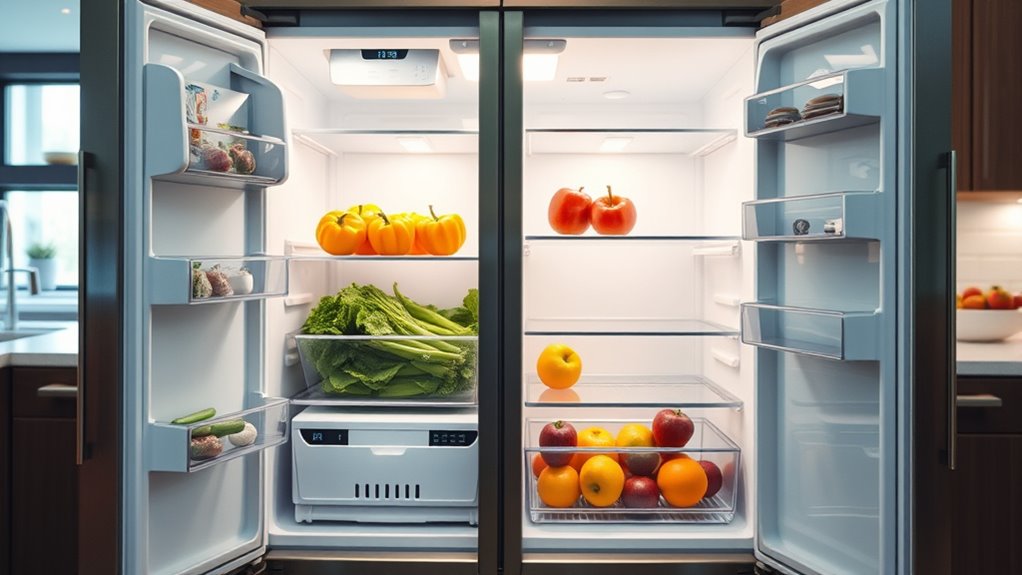
Design variations in dual evaporator refrigerators primarily focus on how the refrigerant circuits and compartment controls are configured to maximize performance. You’ll find different setups that enhance efficiency and compartment independence. Many use a serial refrigerant flow, passing through the fresh food evaporator first, then the freezer, to streamline cooling. Some models incorporate separate capillary tubes or even individual compressors for each compartment, boosting control. Independent temperature and pressure controls allow you to finely tune each zone, improving food preservation. Circuits may include heat exchangers and thermally coupled tubes, enhancing thermal management and energy efficiency. Additionally, the choice of refrigerant type influences how effectively humidity zones are maintained and impacts overall system performance. These design choices influence compressor load, energy consumption, and maintenance needs, ultimately shaping how well your fridge maintains optimal humidity and temperature zones. Proper system design can significantly improve the durability and efficiency of dual evaporator refrigerators.
Impact of Humidity Control on Food Quality and Shelf Life
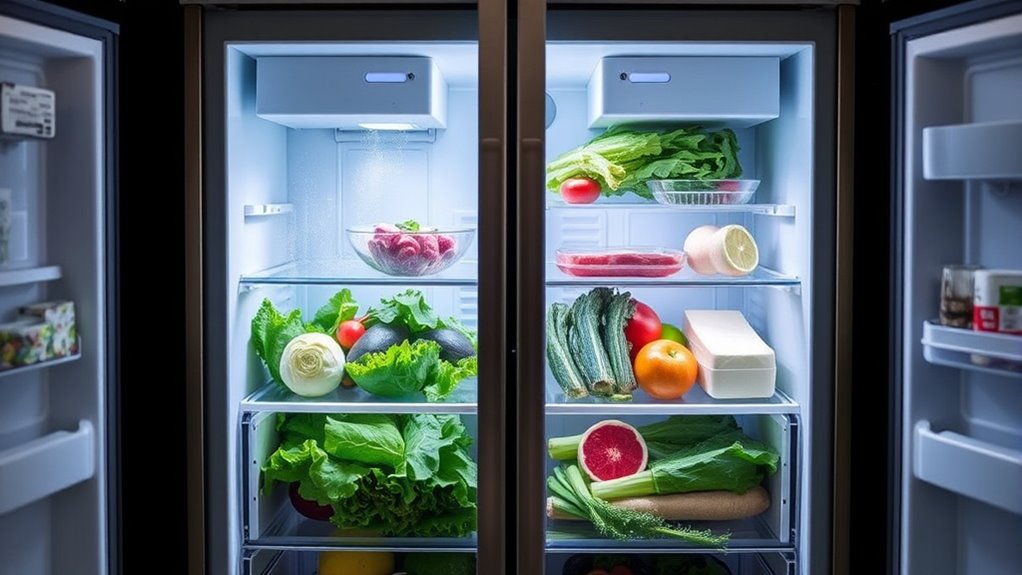
Humidity control plays a vital role in maintaining food quality within dual evaporator refrigerators. By keeping higher humidity levels in the fresh food compartments, you prevent moisture loss, which helps preserve texture and freshness. Reduced frost formation due to temperature regulation maintains produce’s crispness and prevents wilting. Stable humidity minimizes drying and desiccation, protecting the taste and appearance of fruits and vegetables. It also reduces microcracking and dehydration, enhancing overall food quality. In regard to shelf life, high humidity delays spoilage processes and slows microbial growth. Moisture retention prevents freezer burn and mold, extending the freshness of frozen and perishable items. Controlled humidity, combined with independent temperature management, ensures your food stays fresher longer, reducing waste and maintaining ideal quality. Cookies can be used to optimize humidity settings and improve user experience with smart refrigerator technology.
Selecting a Refrigerator With Optimal Humidity Zones

Choosing a refrigerator with ideal humidity zones begins with understanding how different storage compartments can extend the freshness of your produce. To select the best model, consider these key features:
- Look for adjustable sliders or controls that let you customize airflow for high or low humidity needs.
- Choose models with separate compartments or divided drawers to store various produce types without cross-contamination.
- Ascertain the fridge has climate-controlled drawers that maintain stable humidity levels independently.
- Check for advanced systems, like moisture-regulating membranes, which extend freshness and reduce spoilage.
Frequently Asked Questions
How Do Dual Evaporator Systems Affect Overall Refrigerator Maintenance Needs?
You’ll find that dual evaporator systems increase your refrigerator’s maintenance needs because they have more components to inspect, clean, and repair. You’ll need to monitor multiple coils, valves, fans, and sealed circuits regularly. This complexity means more frequent servicing, careful refrigerant handling, and specialized knowledge. Expect higher costs and longer repair times, as each zone requires precise adjustments to keep humidity and temperature balanced across compartments.
Can Humidity Zones Be Customized for Specific Produce Types?
Absolutely, you can customize humidity zones for specific produce types—if your fridge allows it. With adjustable drawers and smart controls, you get to play produce sommelier, tailoring moisture levels for greens, fruits, or deli meats. Just remember, not all models are so generous. So, if you’re aiming for perfect freshness, pick a fridge with flexible, user-friendly humidity controls—otherwise, you’re just guessing and hoping for the best.
What Are the Typical Energy Savings Associated With Dual Evaporator Models?
You can expect dual evaporator models to save about 18% more energy than single evaporator units. They achieve this by reducing frost buildup, optimizing temperature control, and cutting down on defrost cycles, which lowers energy use. These systems also improve efficiency through independent compartment management, leading to less heat transfer and moisture-related cooling loads. Overall, they markedly decrease electricity consumption, saving you money on utility bills over the long term.
Do Dual Evaporators Reduce Noise Levels During Operation?
Yes, dual evaporators can decrease noise levels during operation. You’ll notice less humming and rattling because each evaporator operates independently, distributing the mechanical activity. Optimized fan speeds and added vibration dampening also help keep the noise down. However, if not properly maintained, the extra fans and motors can add to the noise. Regular cleaning, proper leveling, and timely repairs ensure your dual evaporator fridge stays quieter.
How Do Dual Evaporator Systems Impact the Initial Purchase Cost?
A penny saved is a penny earned, and choosing a dual evaporator system does impact your initial cost. You’ll pay more upfront because of extra components, complex controls, and specialized insulation needed for separate humidity zones. While it raises the purchase price, you gain better food preservation, less spoilage, and energy efficiency. So, though it’s an investment now, it can save you money and hassle in the long run.
Conclusion
By choosing a refrigerator with dual evaporators, you can enjoy up to 50% longer freshness for your fruits and vegetables, thanks to precise humidity control. These systems prevent odor transfer and keep different food zones optimized for quality. With better temperature and humidity management, you’ll reduce food waste and save energy. So, investing in a dual evaporator fridge means smarter storage and fresher food—making your kitchen more efficient and your meals tastier.


